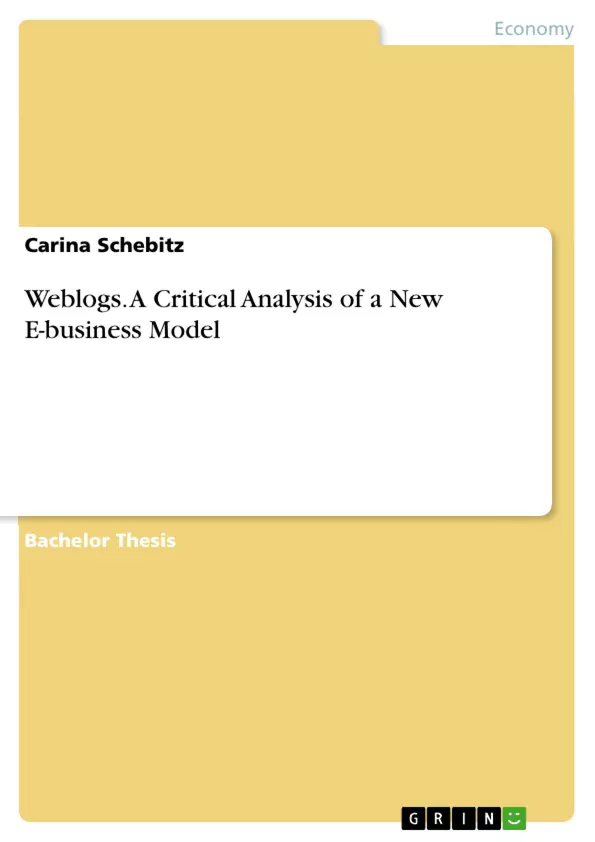The primary function of this bachelor thesis is to connect the subject of E-Business models with the web 2.0 phenomenon of weblogs. Therefore it is necessary to ascertain whether blogs can commercially perform as a characteristic of E-Business models. Furthermore, this paper should reveal what specific factors need to be considered and which challenges can occur when professionally operating a blog. Thus the digital economics’ research, for example, the literature of Kollmann, Reynolds or Wirtz, provide a broad base concerning the revenue models and the categorization of classical E-Businesses such as E-Commerce-Websites. However it does not scrutinize the particular requirements of weblogs. On the other hand, the relatively new body of literature about blogs focuses on the software and technological fundamentals, the specific characteristics as well as the different characteristics. Moreover in the year 2016, many professional bloggers exist that can make a living from their publishing occupation. This indicates that weblogs already represent a form of an E-Business model. However, the author does not know of published studies nor papers that have empirically investigated or described the business models of weblogs.
In order to fill that void, the purpose of this bachelor thesis is to provide a systematical guideline from an economic perception in order to establish a weblog. It will include potential risk factors and particular requirements, as the following chapters will enumerate more clearly. Ultimately this paper’s aim is to serve potential future bloggers in gaining knowledge about factors they need to pay attention to from the beginning of their work as well as marketers that need to regard unwritten rules when it comes to working with influencers such as bloggers.
Table of Contents
- Introduction
- Problem Description
- Objectives
- Scope of Work
- Theoretical Background
- Weblogs
- Authenticity
- Interaction
- Characteristics
- E-Business Model
- Value Proposition
- Value Creation Architecture
- Revenue Model
- Methodology of Analysis
- Selection of the Instruments
- Five Forces
- Analysis of Weblogs
- Classification within E-Business Models
- Value Proposition of Weblogs
- Value Creation Architecture of Weblogs
- Revenue Model
- Transaction-based Revenue
- Transaction-independent Revenue
- Display Advertisement
- Native Advertisement
- Expense Factors
- Five Forces
- Rivalry among Existing Competitors
- Threat of new Entrants
- Threat of Substitute Products or Services
- Bargaining Power of Customers
- Bargaining Power of Suppliers
- Critical Summary and Evaluation
- Target Achievements
- Prospects
Objectives and Key Themes
This bachelor thesis analyzes the weblog business model in terms of its specific features and potential for success. It focuses on examining the model's value proposition, value creation architecture, and revenue streams, as well as assessing its competitive landscape. The study aims to provide a comprehensive understanding of weblogs within the broader context of e-business models.- The characteristics and functionalities of weblogs as a distinct communication and business platform.
- The value proposition of weblogs in relation to user needs and market demands.
- The architecture of value creation within the weblog business model, including key processes and relationships.
- The various revenue models employed by weblogs, encompassing both transaction-based and transaction-independent strategies.
- An analysis of the competitive environment surrounding weblogs, considering factors such as the threat of new entrants, substitute products, and bargaining power of customers and suppliers.
Chapter Summaries
- Introduction: This chapter provides a clear definition of the topic, outlining the problem of analyzing weblogs as a new e-business model. It also states the objectives and the scope of the work, setting the stage for the following analysis.
- Theoretical Background: This chapter explores the theoretical foundations of the research, defining key concepts related to weblogs and e-business models. It analyzes the characteristics of weblogs, focusing on authenticity, interaction, and unique features, while also examining different aspects of e-business models, such as value proposition, value creation architecture, and revenue models.
- Methodology of Analysis: This chapter describes the research methodology employed for analyzing weblogs. It explains the selection of instruments used for data collection and analysis, including the five forces framework. This section provides a clear framework for the subsequent analysis of weblogs.
- Analysis of Weblogs: This chapter dives deep into the analysis of weblogs, starting with their classification within e-business models. It examines their value proposition and how they create value for users. It then explores the value creation architecture of weblogs and analyzes their various revenue models, including transaction-based and transaction-independent approaches. The chapter concludes with an application of the five forces model to assess the competitive environment of weblogs.
Keywords
The key focus of this study lies in understanding the weblog business model as a new player in the e-business landscape. Key terms include weblogs, e-business models, value proposition, value creation architecture, revenue models, five forces analysis, authenticity, interaction, and digital communication platforms.Frequently Asked Questions
Can a weblog be considered a formal E-business model?
Yes, weblogs can commercially perform as E-business models by incorporating value propositions, value creation architectures, and specific revenue models.
What are the main revenue streams for professional bloggers?
Revenue is categorized into transaction-based and transaction-independent income, including display advertisements, native advertising (sponsored content), and affiliate marketing.
Why are authenticity and interaction important for blogs?
Authenticity and interaction are unique characteristics of weblogs that build trust with the audience, which is essential for influencer marketing and long-term commercial success.
What is the "Five Forces" analysis in the context of blogging?
It assesses the competitive environment by looking at the rivalry among existing bloggers, the threat of new entrants, substitute services (like social media platforms), and the bargaining power of customers and suppliers.
What are the key expense factors for a professional blog?
Expenses include software and technological infrastructure, content creation costs, marketing, and the time investment required to maintain high interaction levels.
- Quote paper
- Carina Schebitz (Author), 2016, Weblogs. A Critical Analysis of a New E-business Model, Munich, GRIN Verlag, https://www.grin.com/document/428190



